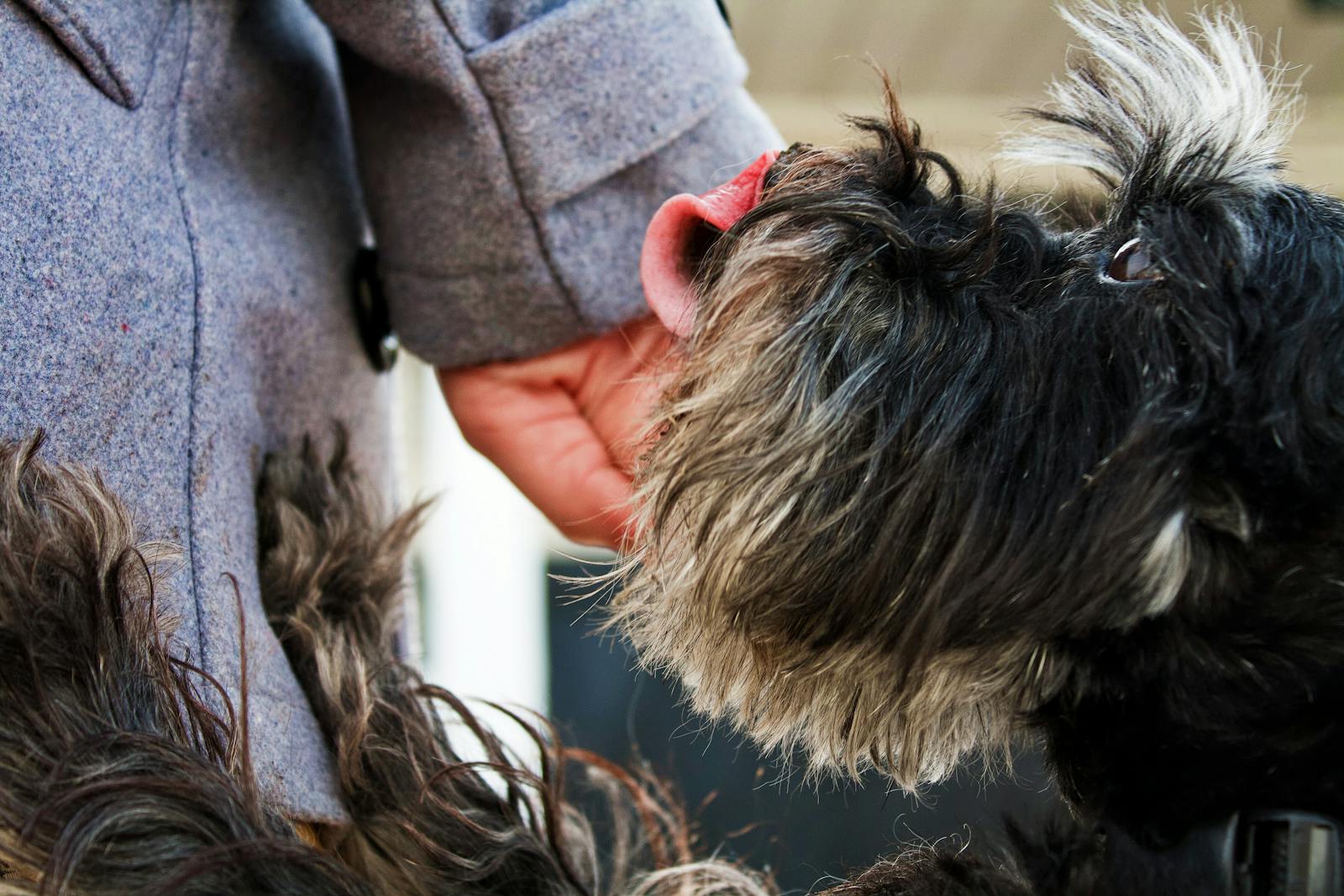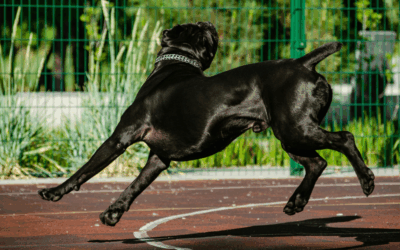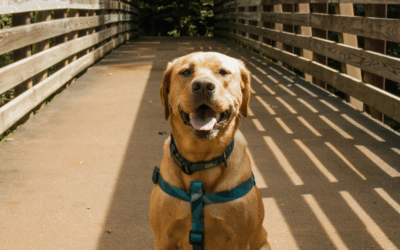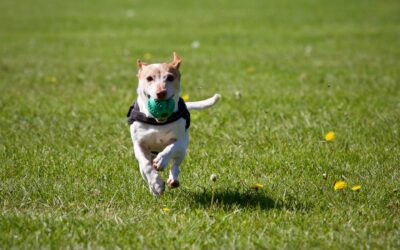If your dog is constantly licking you, you’re not alone. It’s a behavior that many dog owners experience, especially with young dogs and puppies. While it might seem cute or affectionate (or even a little annoying), your dog’s licking habits can actually be a way of communicating or expressing how they feel.
You may be thinking ‘why does my dog lick me so much? Is it just a quirky canine trait, or could it be a sign of something deeper?’ Understanding why your dog is licking you so often can help you strengthen your bond with them and address any underlying issues.
This blog will explore the reasons behind this common behavior when licking might indicate a bigger problem, and what steps you can take to manage it if necessary.

A Few Reasons Your Dog Licks You
Dogs lick for a variety of reasons. It’s a natural behavior that comes from both their evolutionary instincts and their unique relationship with humans. Here are a few reasons why most dogs lick their owners (and others):
1. To Show Affection
One of the most common reasons dogs lick is to show affection. Much like how wild canids groom each other in the pack, your dog may lick you as a way to bond and express closeness. Puppies lick their mother or sibling as a gesture of love and connection.
When your dog licks your face, hands, or other parts of your body, it’s often their way of saying, “I love you.” This affectionate behavior is likely something most dog owners have experienced and cherish.
2. To Taste or Smell
Ever noticed how your dog’s licking behavior intensifies after you’ve just eaten? Dogs have an incredible sense of smell and taste that makes them curious about even the faintest aroma. If your hands or face have leftover food particles, sweat, or even ear wax, your dog will want to explore it.
To a dog, humans often “taste good,” especially after a meal or exercise when traces of salt and food linger on our skin. Their licking could simply be their way of savoring those interesting smells and tastes their nose picked up on.
3. To Gain Attention
Licking can also be used as a way to get your attention. If your dog learns that licking will make you talk to them, laugh, or pet them, they might start doing it regularly as part of their playbook for attention-seeking behavior.
Even negative attention, like saying “Stop licking me,” can reinforce the behavior. Dogs just want to engage with you. For them, licking is one of many ways to start a social interaction.
4. To Relieve Anxious Feelings
Just like humans chew their nails or pace when they feel stressed, dogs may lick to self-soothe when they’re anxious. For some pups, excessive licking becomes a calming mechanism to deal with boredom, separation anxiety, or even a reaction to certain medications.
If your dog is licking non-stop, like their paws, the furniture, or even you, this could be a sign of anxiety or obsessive compulsive disorder.
5. To Communicate Their Needs
A dog lick isn’t just random; sometimes, it’s their way of asking for something. Puppies and young dogs often lick their owners when they’re hungry, thirsty, or need to go outside. Over time, many dogs learn that licking gets their needs met, making it a go-to strategy for communication.
6. To Groom You
Dogs lick themselves as part of their grooming routine, so don’t be surprised if your dog tries to groom you, too. This grooming instinct stems from their pack mentality, where wild dogs groom one another to maintain hygiene and social bonds.
Your dog’s desire to clean you shows they see you as part of their “pack,” which is both sweet and endearing.
7. To Interpret Your Mood
Dogs are incredibly intuitive creatures that rely on body language and subtle cues to understand how their owners feel. By licking you, they may be trying to comfort you if they sense you’re stressed or sad. This behavior is tied to their concern for your well-being and desire to provide comfort.
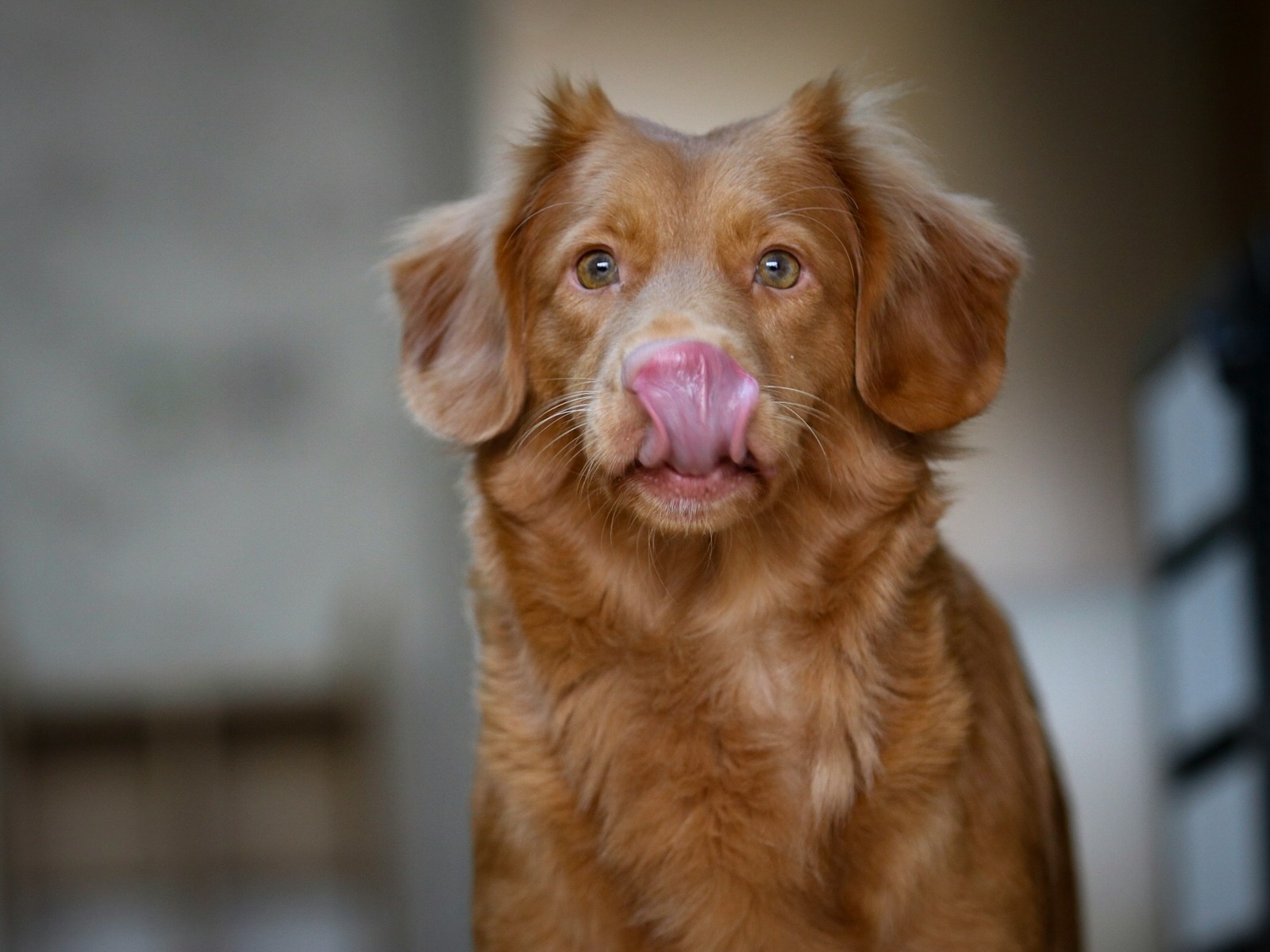
Signs of Excessive Licking That May Be Unhealthy
While licking is a natural behavior for dogs, excessive or compulsive licking can indicate underlying health or behavioral problems. Here are some signs that might suggest your dog’s licking habits are tipping into unhealthy territory:
Constant Licking of One Spot
If your dog focuses their licking on a single area—either on their body, their bedding, or even on you—it could be a sign of pain, irritation, or an underlying medical condition. Persistent licking of a specific area on their body might point to a wound, skin infection, allergies, or even joint pain.
Bald Patches or Skin Irritation
Excessive self-licking often leads to visible signs on your dog’s coat or skin. Look for raw or red patches, bald spots, or hardened areas caused by constant licking. These can indicate conditions like hot spots or acral lick dermatitis, which may require veterinary attention.
Licking That Interrupts Normal Activity
When licking becomes so frequent that it disrupts your dog’s daily activities—such as eating, playing, or resting—it may signal anxiety or stress. Dogs may compulsively lick as a coping mechanism for underlying emotional discomfort.
Obsessive Licking of Objects or Floors
If your dog seems fixated on licking walls, furniture, or floors, this could indicate pica (an eating disorder) or a potential gastrointestinal issue. Sometimes dogs use licking as a way to soothe stomach discomfort or cope with boredom.
Licking Leading to Other Symptoms
Other accompanying symptoms—like vomiting, diarrhea, limping, or behavioral changes—alongside excessive licking point to a more significant issue. These signs should always prompt a visit to the vet for a thorough examination.
Paw Licking or Chewing
Frequent licking or chewing of paws may result from allergies, yeast infections, or foreign objects stuck in the paw pads. Left unchecked, this behavior can escalate, leading to infections or further discomfort.
If you notice any of these signs, it’s important to address them promptly to prevent further complications. A veterinarian can help identify the root cause behind excessive licking and suggest appropriate treatments or behavioral modifications. By understanding when licking shifts from normal to problematic, you’ll be better equipped to keep your furry friend healthy and happy.
When Licking Becomes Excessive
While licking is a natural behavior for dogs, excessive licking can sometimes indicate a bigger issue. If your dog is constantly licking you, themselves, or objects around the house, it might be worth exploring why.
Possible Health Issues
Excessive licking could be a sign of an underlying health issue, such as:
- Allergies, which make your dog itchy and irritable
- Pain or discomfort in certain areas of their body
- Gastrointestinal problems that lead to nausea and increased licking
- Dental problems or irritation in your dog’s mouth
If you suspect a health issue, consult your vet to rule out any medical causes.
Anxiety or Compulsive Behavior
Some dogs develop obsessive-compulsive tendencies, leading to non-stop licking. This can be triggered by stress, lack of mental stimulation, or past trauma. Anxious dogs often exhibit other behaviors like pacing, whining, or destructive chewing, so keep an eye out for these signs.
How to Manage Your Dog’s Licking Habits
While most dogs lick to show affection or communicate, excessive or unwanted licking can be addressed with positive reinforcement and proper training. Here’s how you can manage it:
Redirect Their Energy
If your dog is licking you because they’re bored or have excess energy, provide them with a chew toy or engage them in activities like fetch or trick training. Redirecting their focus can help reduce licking.
Set Boundaries
It’s okay to gently discourage excessive licking if it makes you feel uncomfortable. Use commands like “Stop” or “Off,” and reward good behavior with treats or praise. Be consistent so your pup learns the boundaries.
Engage in Regular Training
Training your dog can help control licking and other behaviors. Work with a dog behaviorist if licking becomes problematic or disruptive to their well-being.
Provide Mental Stimulation
Licking due to boredom or anxiety can be reduced by keeping your dog mentally engaged. Puzzle toys, interactive feeders, and enrichment games can help keep their mind occupied.
Consult a Vet or Behaviorist
If problem licking persists or seems compulsive, seek professional advice from a vet or dog behaviorist. They can rule out health issues and provide targeted solutions to address excessive licking.
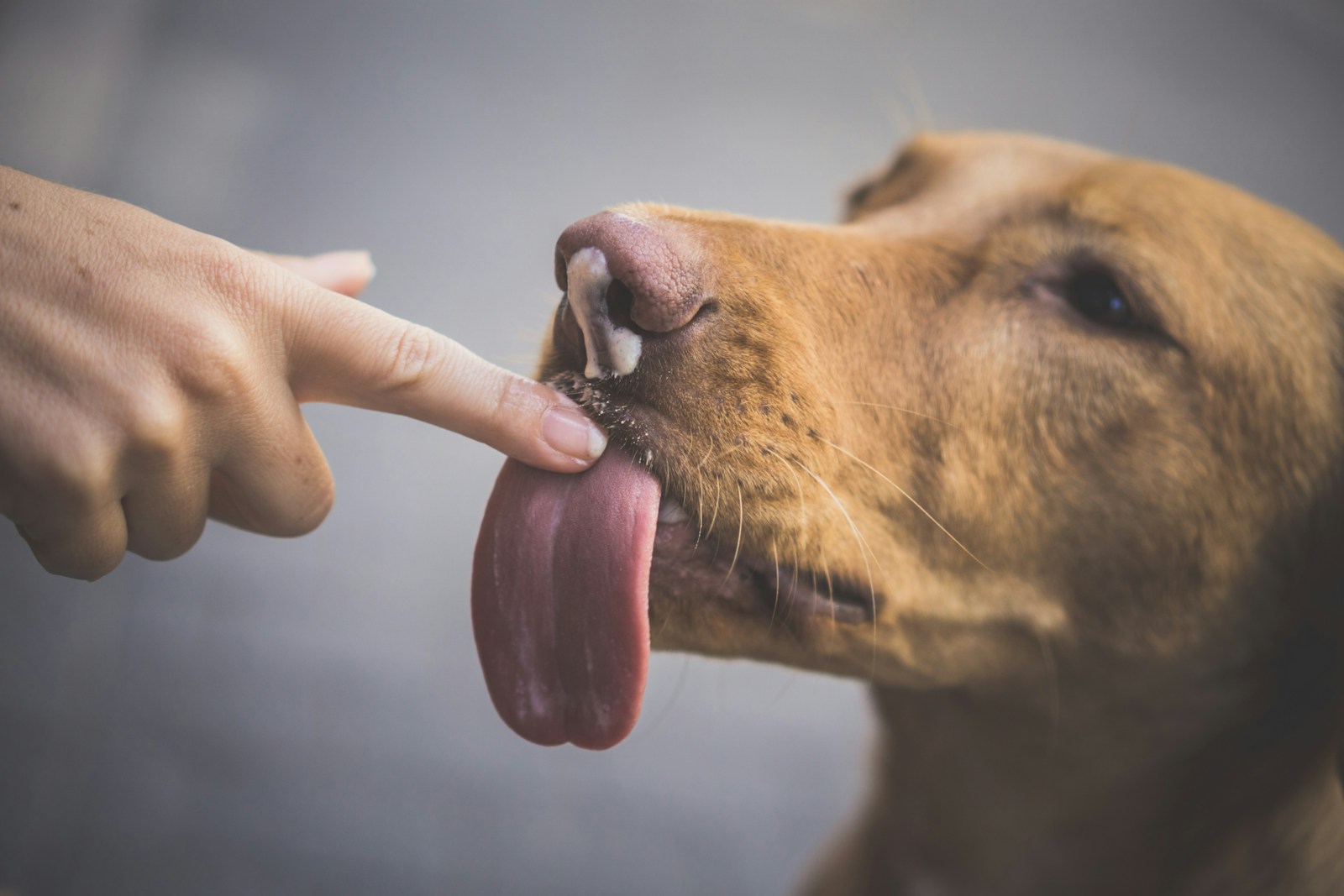
Top Products to Help Manage Excessive Licking
When dealing with excessive licking behavior in your dog’s health, certain products can provide relief and help address the underlying issues. Below are six safe and effective options designed to support your furry friend:
- Vet’s Best Hot Spot Spray: This natural formula uses tea tree oil and aloe vera to provide quick relief for itchy or irritated skin. It’s safe for frequent use and can soothe specific areas your dog targets.
- Zesty Paws Allergy Immune Supplement: These easy-to-feed chews are packed with ingredients like colostrum and probiotics that support your dog’s immune health and combat allergies, which are often the cause of excessive licking.
- ENZYME-Derived Dog Paw Balms: A paws-safe balm made from non-toxic, soothing ingredients like shea butter and coconut oil to treat dryness, cracking, or irritation that leads dogs to chew or lick their paws.
- BingPet Adjustable Dog Cone: A dog-friendly e-collar alternative designed to prevent licking of wounds or hotspots and protect healing areas.
- NaturVet Bitter Spray: This all-natural, non-toxic spray deters licking and chewing due to its bitter taste, without harming your dog. It’s ideal for protecting wounds, furniture, and other hotspots.
- Hill’s Prescription Diet for Dermatitis & Skin Disorders: This veterinarian-recommended dog food addresses nutritional deficiencies related to excessive scratching and licking, promoting healthy skin and coat.
These products, along with guidance from your veterinarian, can make a significant difference in managing your dog’s licking behavior while ensuring their comfort and safety. Always choose options tailored to your pet’s specific needs for the best results.

Bring your pup to Snouts and Stouts Indoor Dog Park and Bar for a day of fun for both you and your furry friend!
Wrapping It Up | Why Does My Dog Lick Me So Much?
Your dog’s licking behavior is their way of communicating love, curiosity, and even their needs. While licking is usually nothing to worry about, it’s important to recognize when it becomes excessive or signals an underlying issue.
Understanding this odd dog behavior will not only make you a better pet owner but also strengthen your connection with your furry friend. Whether it’s showing affection or seeking attention, your dog’s licking is just one of the many ways they express themselves in their unique doggy language.
If you’re ready to learn even more about your pup’s quirky behaviors, consider consulting a vet or behaviorist for tailored insights. And remember to treasure all those slobbery dog kisses—they’re part of the joy that comes with being a pet owner.

